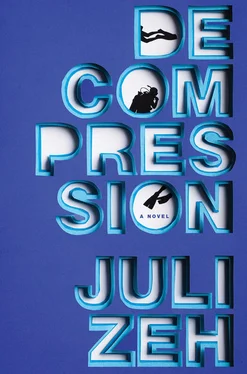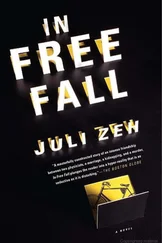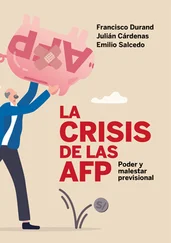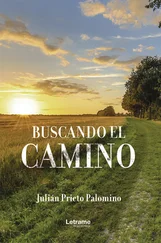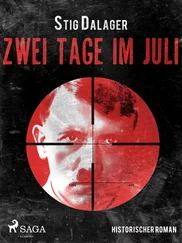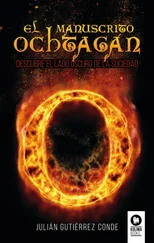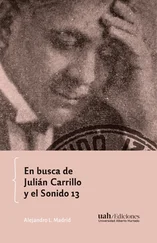Jola listened as though the word of God were coming out of my mouth. Her big eyes began to reflect my own enthusiasm. I found it hard to come to the end.
On November 23 I’d be forty years old, and I wanted to celebrate my birthday one hundred meters below the surface of the ocean. Alone. Or better yet: in the company of a World War II freighter that went missing seventy years ago.
“I want to go too,” Jola said. “I can help the boat crew.”
“This is an expedition, not an excursion,” I said. “Every move the crew makes has to be exactly right.”
She looked at me insistently. “I grew up on ships.”
“Her father owns a Benetti Classic,” Theo said.
I had to pause and digest this information. A used Benetti cost about as much as a luxury penthouse. And in Manhattan, at that.
“Nevertheless,” I said. “I’m sorry.”
“Or you could train me for that depth and then I could dive with you. Lotte would have liked that.”
Against my will, I laughed.
“Please!” Jola cried out. “We have two whole weeks!”
“You’d need at least two years,” I said. “If I tried to take you down there with me, I’d wind up in prison.”
“For how long?” asked Theo, without taking his eyes off Jola’s pleading face.
“For life,” I said. “Convicted of murder.”
“That’s enough,” said Antje, who didn’t like the conversation. “Only professional divers can survive those kinds of expeditions. Would anyone like some cactus pear sorbet?”
“I’d be more than happy to spend a couple of years in prison,” Theo said in the tone of a man who wants to change the subject. “Then I’d finally have enough peace to write.”
Antje drew back the hand that was reaching for his plate. She said, “But in exchange for that, you’d have to harm another person.”
“That’s the advantage, isn’t it?” Theo turned the wine bottle upside down and shook the last drops into his glass. “If someone already wants to go to jail, he gets a free shot. Then all he has to do is pick his target.”
Jola was scraping rabbit pieces off her plate with the back of her knife. Todd caught them on the fly. “Don’t listen to Theo,” Jola said. “Shocking his audience is part of his job. Unfortunately, for the past few years he’s preferred to be shocking at the dinner table rather than the computer keyboard.”
“Which is still better,” Theo said, “than making a fool of yourself by standing in front of a camera and spouting idiotic lines.”
Jola stood up abruptly and walked over to the window. “My idiotic lines,” she said with her back turned to us, “pay our rent.”
Humming and sizzling inside the wall lamp, a moth was burning itself to death. The rabbit fibers between my teeth gave me an uncomfortable feeling that spread through my whole body. Antje raised her head and gave Theo a sympathetic look. “So why don’t you write anymore?” she asked.
Sometimes I could kill her.
JOLA’S DIARY, FIRST DAY
Saturday, November 12. Night .
They’re so cute, both of them. Blond, friendly, down-to-earth. Serving potatoes and bunny stew in their little white house. Normal and … yes, that’s it: healthy somehow. So what does that make us? Abnormal and sick? We didn’t even thank them properly for dinner. All of a sudden the old man was in this big hurry to leave. At first he didn’t even want to wait for dessert. Cactus pear sorbet. Difficulty level: complicated. Time required: two hours. According to my iPhone. Poor Antje. Now I’m waiting for the old man to fall asleep. He doesn’t like me to be lying next to him while he’s trying to doze off. I sleep well, he doesn’t. Sleep turns you into a corpse, he tells me. How am I supposed to relax with a dead person next to me?
I text him: “Sleep well, Theo. I love you.”
His phone chirps in the bedroom. I can hear the sound through the thin wall. No answer. It’s pitch-dark outside. Every now and then a dog howls. Our first night here and already I’m alone on the living-room sofa. This is how it begins, our very last serious attempt to get things straightened out .
“They’re sort of funny.”
This was the prelude to what I called the “postgame analysis.” Scarcely had a person left the room when he or she became the subject of instantaneous, diagnostic discussion. Assessments were compared, details of judgments mutually corrected, and speculations transformed into a consistent psychological profile. Antje and her girlfriends practiced this discipline at the expert level. As for me, when it came to postgame analysis, I was the worst partner imaginable. If Antje gave it a try all the same, she must have felt some real sense of urgency.
I stood at the sink, scraping food remnants from the plates and trying to ignore Todd while he stared a hole in me. Right from the start, it had seemed creepy to me that he not only had the same name as my parents’ now-deceased dog but also looked exactly like him. Antje firmly believed that we’d killed the first Todd by leaving him behind in Germany. I was afraid she believed just as firmly that the second Todd was a reincarnation of the first, whom she’d called back into life by recycling his name.
“Don’t you think?”
I turned my back to her and the dog. I hated it when people judged one another. It was an obsession, a curse. I had left Germany because I couldn’t stand living any longer in an all-encompassing net of reciprocal judgments. Judgers and judged found themselves in a permanent state of war, and everybody, depending on the situation, played one of the two parts. Everything my clients from back home told me was a report from the judgment front. What they thought about their boss. What their colleagues thought about them. What they thought about the chancellor. What they thought about the other divers. Then, after the first three beers some evening, what they thought about how their wives performed. And at the end of their dive holiday, they’d log on to a diving website and post what they thought about how I’d performed. It was as though people were afraid they’d fall silent forever if they stopped passing judgments.
“Sometimes Jola just stares into space,” Antje said. “Like she’s miles away. And she eats nothing. Did that strike you too?”

There was a reason for my aversion to judgments. Before I left Germany on New Year’s Eve in 1997, I had studied law for five years. I belonged to a generation of students who didn’t want school to come to an end. For us, high school graduation was by no means a happy event. It scared us. Most of us had no idea what to start doing with our lives. In school everything had been simple. You knew how to do things right and how much rebellion you could permit yourself. If something went wrong and there was any doubt, it was the teacher’s fault. I did my compulsory military service, extended it for a year with the Army Engineer Divers, and then decided to go for a law degree, because it was said that such a degree left all possibilities open. It wasn’t long before I really began to love my studies. Once again I’d found a field in which I could do everything right. As long as I took notes during lectures and spent three evenings a week in the library, I could enjoy the pleasant feeling that I was on the safe side. As a rule, I passed my exams with grades of 90 or higher. My fellow students’ envy relieved me of the necessity of having any doubts at all.
After five years of study, my scores on the final written examinations were so good they made the impending oral exam seem like a mere formality. I bought a new pair of shoes, shopped around for the most appropriate aftershave lotion, and visited the barber. On the day of the exam I felt slightly nervous, but a sense of impending triumph buoyed me up on the way to the Justice Ministry.
Читать дальше
